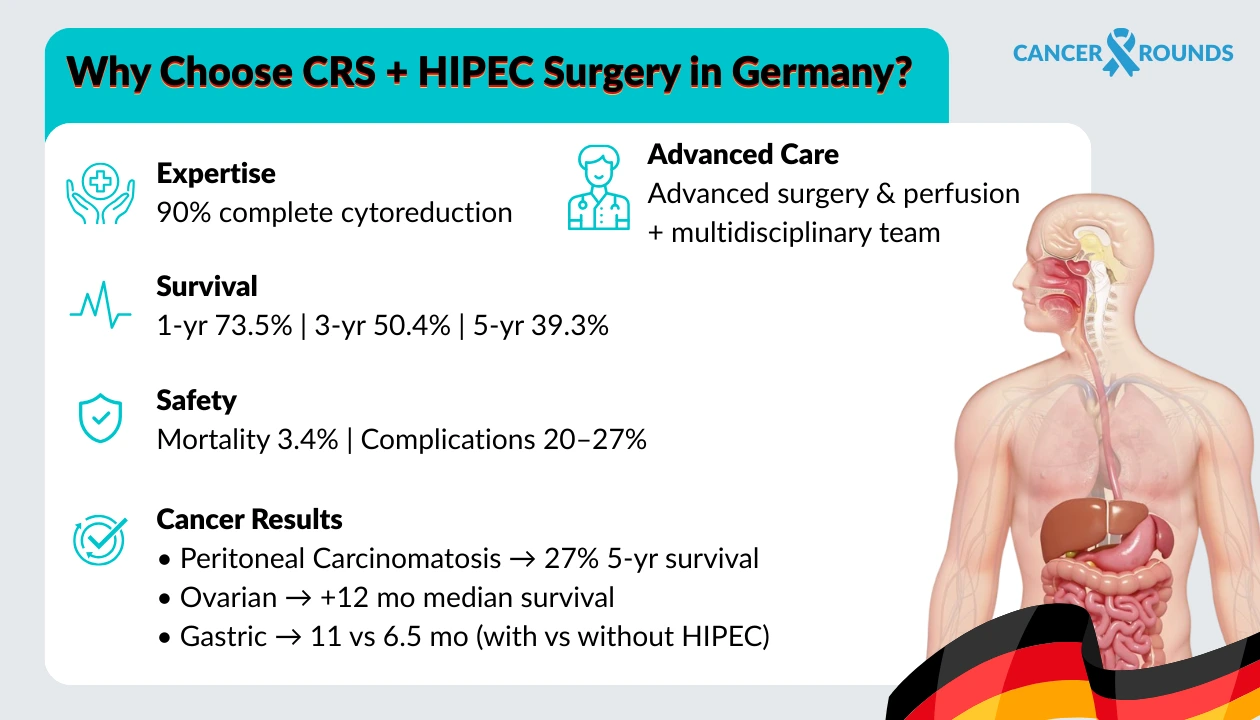Peritoneal Carcinomatosis Treatment with CRS + HIPEC in Germany
What is CRS + HIPEC?
Treatment of Peritoneal Carcinomatosis with CRS + HIPEC in Germany is a revolutionary approach in oncology. CRS (Cytoreductive Surgery) involves the meticulous removal of visible tumors within the abdominal cavity. Once the visible disease is cleared, HIPEC (Hyperthermic Intraperitoneal Chemotherapy) delivers a heated chemotherapy solution directly into the abdomen. This targeted bath, maintained at 41–43 °C, helps destroy any remaining microscopic cancer cells while reducing systemic toxicity. Agents like mitomycin‑C and cisplatin are commonly used for their enhanced efficacy in hyperthermic conditions.
CRS + HIPEC Surgery in Germany: Complete Overview Table
| Aspect | Details |
| Full Name | Cytoreductive Surgery (CRS) with Hyperthermic Intraperitoneal Chemotherapy (HIPEC) |
| Treatment Objective | Removal of visible tumor in the abdomen followed by heated chemotherapy to destroy microscopic cancer cells |
| Primary Indications | – Treatment of Peritoneal Carcinomatosis with CRS + HIPEC – CRS + HIPEC for Stage 4 Ovarian Cancer – CRS + HIPEC for Pseudomyxoma Peritonei – CRS + HIPEC for Mesothelioma |
| Other Eligible Cancers | – Colorectal cancer with peritoneal spread – Appendiceal cancer – Gastric cancer – Peritoneal mesothelioma |
| Pathomechanism | CRS removes all macroscopic tumors; HIPEC delivers heated chemotherapy (42°C) directly into the abdominal cavity to kill residual cancer cells while minimizing systemic toxicity |
| Ideal Candidate | – Stage 4 patients with confined peritoneal disease – Good general health (ECOG 0–2) – Limited comorbidities – Good performance status – Younger patients with localized recurrence |
| Contraindications | – Widespread metastatic disease beyond peritoneum – Poor performance status – Significant comorbidities (heart, lung, liver failure) |
| Success Rate (5-Year Survival) | – Pseudomyxoma Peritonei: 60–80% – Colorectal Carcinomatosis: 30–50% – Ovarian Cancer Stage IV: 35–55% – Peritoneal Mesothelioma: 45–65% |
| CRS + HIPEC vs. Systemic Chemotherapy: Which Offers Better Outcomes in Germany? | CRS + HIPEC shows significantly improved survival in select peritoneal cancers vs. chemotherapy alone. Personalized surgical approach gives it a clear advantage in eligible patients. |
| Estimated Cost in Germany | €25,000–€45,000 (depending on hospital, duration, ICU care, tumor burden) |
| Top Cities & Hospitals in Germany | – Berlin: Charité Universitätsmedizin Berlin – Heidelberg: University Hospital Heidelberg – Munich: LMU Klinikum – Freiburg: University Medical Center Freiburg – Essen: University Hospital Essen |
| Why Choose Germany? | – Leading cancer research hubs – Experienced surgical oncology teams – High-end post-op critical care – Transparent pricing for international patients |
| Pre-Operative Requirements | – PET-CT scan – Tumor marker profiling – Peritoneal Cancer Index (PCI) evaluation – Cardiopulmonary clearance |
| Recovery Time | – Hospital stay: 10–21 days – Full recovery: 6–8 weeks – ICU care: 1–3 days post-op |
| Risks / Complications | – Infection – Bowel obstruction – Fluid imbalance – Prolonged ileus – Bleeding / adhesions |
| CRS + HIPEC for Stage 4 Ovarian Cancer in Germany | Increasingly recommended in platinum-sensitive relapses and as part of interval debulking surgery in advanced stages |
| CRS + HIPEC for Pseudomyxoma Peritonei in Germany | Germany is a global hub for PMP treatment; highly specialized centers handle hundreds of cases annually |
| CRS + HIPEC for Mesothelioma in Germany | Germany offers an advanced, multidisciplinary approach combining surgery, HIPEC, and targeted therapy for rare cancers like peritoneal mesothelioma |
Why Choose CRS + HIPEC Surgery in Germany: Top Destination for Advanced Abdominal Cancers in Germany?
Germany is renowned for medical excellence, and its specialized cancer centres are at the forefront of CRS + HIPEC surgery. With expert surgical teams and strict patient selection protocols, German hospitals achieve complete cytoreduction (CC‑0/CC‑1) in up to 90% of eligible cases. In a landmark study of 1,384 patients treated in Germany, 1-year survival was 73.5%, 3-year survival ~50%, and 5-year survival ~39%, with impressively low post-op mortality (~1.5%).
CRS + HIPEC in Germany: Stage-wise Cancer Types, Hospitals & Cities
| Cancer Type | Stage Treated | Leading Cities | Top Hospitals in Germany |
| Peritoneal Carcinomatosis | Stage 3, 4 | Berlin, Munich, Essen | Charité – Universitätsmedizin Berlin, LMU Klinikum Munich, University Hospital Essen |
| Ovarian Cancer | Stage 3C, Stage 4 | Hamburg, Frankfurt | University Medical Center Hamburg-Eppendorf, Frankfurt University Hospital |
| Pseudomyxoma Peritonei (PMP) | All stages (localized & disseminated) | Leipzig, Heidelberg | Helios Park-Klinikum Leipzig, Heidelberg University Hospital |
| Colorectal Peritoneal Metastasis | Stage 4 with peritoneal spread | Freiburg, Düsseldorf | University Hospital Freiburg, University Hospital Düsseldorf |
| Gastric Cancer with PC | Stage 4 with peritoneal involvement | Hanover, Stuttgart | Hannover Medical School (MHH), Katharinenhospital Stuttgart |
| Peritoneal Mesothelioma | Advanced unresectable | Mainz, Tübingen | University Medical Center Mainz, University Hospital Tübingen |
These centers are equipped with advanced surgical infrastructure and integrated oncology units, ensuring individualized care protocols combining CRS + HIPEC with systemic therapies when needed.
Why CRS + HIPEC for Advanced Abdominal Cancers in Germany?
- Higher cytoreduction rates
- Exceptional long-term survival
- Specialized tumor boards for rare peritoneal cancers
- State-of-the-art post-operative intensive care
For patients seeking the best in integrative cancer care, Germany stands out as a global destination for CRS + HIPEC.
Doctors For CRS + HIPEC Surgery
Need More Recommendations ?
Patient Journey Map for CRS + HIPEC in Germany
Phase 1: Pre-Treatment Coordination
| Step | Description |
| 1. Initial Contact | Patient or referring physician contacts CRS + HIPEC center in Germany (via email, portal, or medical tourism partner). |
| 2. Case Evaluation | Patient sends medical records, imaging (CT/PET), pathology reports. Multidisciplinary tumor board assesses eligibility for CRS + HIPEC. |
| 3. Virtual Consultation | Online/telemedicine consult with surgical oncologist to discuss treatment plan, expectations, and logistics. |
| 4. Travel & Visa Assistance | Medical travel facilitation (visa, documentation, accommodation) provided by hospital or partner agency. |
| 5. On-Arrival Assessment | Patient undergoes final staging, diagnostic laparoscopy if needed, fitness evaluation, and consent process. |
Phase 2: Treatment, Recovery & Follow-up
| Step | Description |
| 6. CRS + HIPEC Procedure | Cytoreductive surgery performed to remove visible tumors, followed by heated chemotherapy infusion (HIPEC) into abdominal cavity. |
| 7. ICU Monitoring | Post-op care in intensive care for 2–3 days, followed by surgical ward recovery (10–14 days typical stay). |
| 8. Recovery & Rehab | Early ambulation, pain control, nutritional rehab. Psychosocial support available. |
| 9. Discharge Planning | Summary report, follow-up plan, medication guidance. Travel fitness certificate provided. |
| 10. Ongoing Follow-up | Regular online follow-ups, imaging every 3–6 months, and access to treating team for queries or recurrence management. |
CRS + HIPEC for Advanced Cancer in Germany: Cost & Doctor Expertise
Cytoreductive Surgery (CRS) with Hyperthermic Intraperitoneal Chemotherapy (HIPEC) is a complex but promising treatment for advanced abdominal cancers, including peritoneal carcinomatosis, colorectal cancer, ovarian cancer, and appendix cancer. In Germany, this advanced surgical procedure is offered at several leading cancer centers equipped with multidisciplinary teams of experienced surgical oncologists, intensive care specialists, and oncology nurses.
The indicative cost of CRS + HIPEC in Germany typically ranges from €30,000 to €55,000, depending on the case complexity, hospital stay duration, ICU care, diagnostics, and postoperative support. This estimate generally includes preoperative imaging (CT/MRI), intraoperative chemotherapy, surgical fees, histopathology, and rehabilitation care.
German specialists in CRS + HIPEC are known for their rigorous patient selection, surgical precision, and high-volume experience, often backed by international publications and trial participation. Many have trained in both oncologic surgery and peritoneal surface malignancies, making Germany a preferred destination for life-extending treatment of abdominal cancers.
CRS + HIPEC in Germany for International Cancer Patients: DFS Outlook & Cancer Types Treated
Germany is a leading destination for international patients seeking advanced cancer treatment, particularly CRS + HIPEC—a combination of cytoreductive surgery and heated intra-abdominal chemotherapy. This approach offers renewed hope for select patients with peritoneal surface malignancies by removing visible tumor burden and eradicating microscopic disease.
Common cancer types treated with CRS + HIPEC in Germany include:
- Colorectal cancer with peritoneal metastasis
- Ovarian cancer with peritoneal spread
- Appendix cancer (pseudomyxoma peritonei)
- Gastric cancer with limited peritoneal involvement
- Peritoneal mesothelioma
- Selected recurrent abdominal cancers
For properly selected patients, the disease-free survival (DFS) can range from 18 to 60 months, depending on factors such as tumor origin, PCI (Peritoneal Cancer Index), and complete cytoreduction (CC score). German centers prioritize multidisciplinary tumor boards, high-definition imaging, and individualized preoperative evaluation to optimize outcomes.
International patients are supported by the cancer rounds team with second opinions, travel coordination, interpreter services, visa assistance, and post-treatment care, ensuring a safe and smooth experience. Germany’s top CRS + HIPEC surgeons are globally recognized for research leadership, low recurrence rates, and high post-op survival standards.
Indications & Contraindications
Indications:
- CRS + HIPEC for Stage 4 Ovarian Cancer in Germany: Proven to enhance survival (median OS ~45 months vs ~34 months with surgery alone).
- CRS + HIPEC for Pseudomyxoma Peritonei in Germany: Especially beneficial for low-grade mucinous tumors of appendiceal or ovarian origin. 5-year survival can reach up to 82%.
- CRS + HIPEC for Mesothelioma in Germany: Offers median survival of 52–92 months, with 5-year survival rates as high as 63%.
- Colorectal & Gastric Peritoneal Metastases: Improved survival in select patients with low PCI scores.
Contraindications:
- Peritoneal Cancer Index (PCI) > 20–25
- Extensive tumor invasion (e.g., mesenteric root, hepatic pedicle)
- Poor performance status or comorbidities
Pathomechanism & Success Logic
CRS eliminates all visible cancer. HIPEC ensures the destruction of invisible remnants through direct contact with heated chemotherapeutic agents. Heat increases drug penetration and tumor sensitivity, making this combination highly effective. CRS + HIPEC vs. Systemic Chemotherapy: Which Offers Better Outcomes in Germany? Studies confirm the superiority of CRS + HIPEC in achieving prolonged disease-free and overall survival.
Ideal Patient Profile
The best candidates are:
- Diagnosed with peritoneal surface malignancies (ovarian, pseudomyxoma, colorectal, mesothelioma)
- Medically fit for major abdominal surgery
- With low to moderate PCI scores
- Able to undergo multidisciplinary evaluation
Patient Success Stories
- Pseudomyxoma Peritonei: German series reported 5-year survival ~71%, with some patients living disease-free for over a decade.
- Stage IV Ovarian Cancer: Multicentre cohorts in Europe show >70% complete cytoreduction, low mortality (0.8%), and improved long-term survival.
- Peritoneal Mesothelioma: Patients undergoing CRS + HIPEC achieved median OS of 98 months and DFS of 59 months.
- Colorectal Carcinomatosis: When PCI <12, 5-year survival rates exceeded 50%.
5 easy Steps to Get Treated in Germany

Share Case Details

Get Expert Opinion and Hospital Quotes

Get Visa Invitation & Hotel Recommendations

Get Received At Airport and Start Your Treatment

Travel Back and Get Followups Through Us
Best Hospital for Peritoneal Cancer Treatment with CRS + HIPEC in Germany
| Hospital | Institutional Credentials | Notes |
|---|---|---|
| LMU Klinikum Munich (University Hospital LMU Munich) | Regularly ranked among Germany’s top hospitals and part of national German Centers for Translational Cancer Research (DKTK) | Largest multidisciplinary facility in Germany; high volume of advanced HIPEC procedures; strong research integration |
| Universitätsklinikum Ulm (Ulm University Hospital) | Coordinates a Visceral Oncology Center under German cancer research consortiums | |
| Carl Gustav Carus University Hospital Dresden (TU Dresden) | Hosts National Center for Tumor Diseases (NCT Dresden/UCC), integrated in leading cancer‐care network | Very experienced in CRS + HIPEC, including colorectal and gastric peritoneal disease |
Top Doctors & Departments for CRS + HIPEC in Germany
| Doctor | Hospital & City | Department & Specialties | Highlights | Indicative Cost (€) |
| Prof. Dr. med. Jens Werner | University Hospital LMU, Munich | General, Abdominal, HPB, Colorectal, Endocrine, Transplant, Bariatric & Hernia Surgery | – Leading expert in liver, pancreas, GI & transplant surgeries – Robotic & minimally invasive techniques (da Vinci) – Internationally acclaimed | From 68,210 |
| Prof. Dr. med. Nuh Rahbari | University Hospital Ulm, Ulm | General and Abdominal Surgery, HPB Surgery, Colorectal, Endocrine, Hernia, Bariatric Surgery | – Special focus on GI cancers – Certified by German Cancer Society (DKG) – High-tech facilities | From 63,823 |
| Prof. Dr. med. Jürgen Weitz | University Hospital Carl Gustav Carus, Dresden | Abdominal, Colorectal, HPB, Hernia, Bariatric, Endocrine, Thoracic, Vascular Surgery | – Expert in complex abdominal surgeries – da Vinci Xi-assisted surgeries – Patient-centered & hygienic care | Not listed |
FAQ
Q.1 What is CRS + HIPEC, and how is it different from regular cancer surgery?
Cytoreductive Surgery (CRS) removes all visible tumors in the abdominal cavity, followed by HIPEC, where a heated chemotherapy solution is circulated in the abdomen to kill remaining microscopic cancer cells. This dual approach is more effective for peritoneal cancers than conventional treatments.
Q.2 Which cancers can be treated with CRS + HIPEC in Germany?
CRS + HIPEC is offered in Germany for pseudomyxoma peritonei, colorectal cancer with peritoneal metastasis, gastric cancer, ovarian cancer, appendiceal cancer, and mesothelioma.
Q.3 Why is Germany preferred for CRS + HIPEC treatment?
Germany is known for its high surgical standards, specialized oncological hospitals, multidisciplinary cancer boards, and access to cutting-edge robotic technology, ensuring higher survival and lower recurrence.
Q.4 What is the success rate or disease-free survival (DFS) after CRS + HIPEC in Germany?
Disease-Free Survival (DFS) rates vary based on cancer type and stage. For colorectal peritoneal metastasis, the 3-year DFS can reach 40–50%, especially when treated at high-volume centers like University Hospitals in Munich, Ulm, and Dresden.
Q.5 How long do patients need to stay in Germany for this treatment?
The typical medical travel duration is 3–5 weeks, including pre-surgical evaluation, CRS + HIPEC procedure, ICU monitoring, post-op care, and recovery before flying back.
Q.6 Who are the best doctors for CRS + HIPEC in Germany?
Top experts include:
- Prof. Dr. Jens Werner (LMU Munich) – transplant and HPB specialist
- Prof. Dr. Nuh Rahbari (Ulm) – gastrointestinal oncologic surgery
- Prof. Dr. Jürgen Weitz (Dresden) – minimally invasive, da Vinci-trained surgeon
Q.7 Is robotic (da Vinci) CRS + HIPEC available in Germany?
Yes. Leading German centers such as Dresden and Munich offer robot-assisted CRS + HIPEC, which provides greater precision, less blood loss, and faster recovery for select patients.
Q.8 Can international patients get treatment under fast-track programs?
Yes. Hospitals like LMU Munich and Ulm have International Patient Departments that coordinate medical visas, priority appointments, accommodation, and multilingual care support.
Q.9 What are the risks or side effects of CRS + HIPEC?
Potential complications include:
- Infections
- Bowel leaks
- Delayed wound healing
- Fatigue
- Temporary kidney or bone marrow suppression
However, these are closely monitored by experienced surgical teams in Germany.
Q.10 Is CRS + HIPEC suitable for elderly patients?
With appropriate cardiac and pulmonary clearance, even patients above 70 can be considered if they are otherwise fit. Germany follows individualized patient selection based on medical fitness, not just age.
Q.11 How do German hospitals ensure quality in CRS + HIPEC procedures?
- Accredited by German Cancer Society (DKG)
- Operate within multidisciplinary tumor boards
- Follow evidence-based HIPEC protocols
- Provide intensive post-op rehabilitation and support
Q.12 What tests are needed before undergoing CRS + HIPEC?
Preoperative workup includes:
- PET-CT or MRI abdomen
- Colonoscopy/endoscopy (if GI cancer)
- Blood markers (CEA, CA125, CA19-9)
- Cardiac and pulmonary clearance
These are usually done within the first week of arrival in Germany.
Q.13 How can I contact CRS + HIPEC cancer hospitals in Germany?
You can connect via International Patient Services of hospitals like:
- LMU Klinikum Munich
- Universitätsklinikum Ulm
- Carl Gustav Carus University Hospital Dresden
Or through medical facilitation teams like CancerRounds for smoother coordination.
Q.14 What is the post-operative recovery like?
Recovery involves:
- 7–10 days in the hospital (including ICU)
- Physical therapy and nutritional rehab
- Pain management
- Regular follow-up imaging
Patients are advised to rest and avoid strenuous activities for 4–6 weeks.
In Summary
CRS + HIPEC Surgery in Germany: Top Destination for Advanced Abdominal Cancers in Germany offers renewed hope to those facing dire diagnoses. Whether you’re exploring CRS + HIPEC for Stage 4 Ovarian Cancer in Germany, considering the Treatment of Peritoneal Carcinomatosis with CRS + HIPEC in Germany, or looking into CRS + HIPEC for Pseudomyxoma Peritonei in Germany, Germany delivers exceptional outcomes. This integrative approach is reshaping cancer care—one patient, one success story at a time.
Need Help Navigating CRS + HIPEC Treatment in Germany?
If you or a loved one is considering CRS + HIPEC surgery for advanced abdominal cancers, our expert support team at Cancer Rounds is here to guide you through every step — from hospital selection and medical records review to travel coordination and follow-up care.
Contact the Cancer Rounds Team for detailed information, second opinions, or to begin your treatment journey in Germany.
You May Be Also Interested In
All Treatment Pages
Related Patient Stories

I came from Fiji to India with Cancer Rounds. Dr. Deepti Singh at Apollo helped me fight ovarian cancer. I am feeling much better now.
Our Impact
CancerRounds is making quality cancer care accessible to more people every day.




Why Choose India for Cancer Treatment?

World-Class Care
Skilled oncologists provide top-tier medical services

Affordable Treatment
Costs are significantly lower than in Western countries.

Comprehensive Packages
Hospitals offer all-inclusive plans covering surgery, stay, and aftercare.

Easy Accessibility
Well-connected airports and international flight routes.

Proven Success
High patient satisfaction and positive treatment outcomes
Thank You!
Your form has been submitted successfully.




 Chat on WhatsApp
Chat on WhatsApp